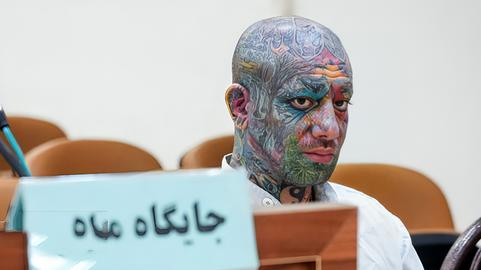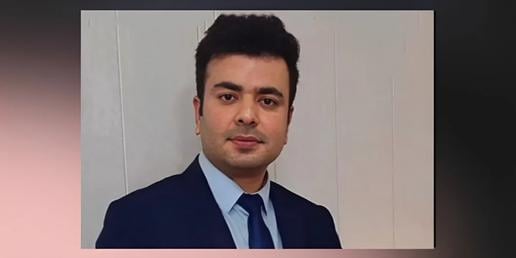He was one of the most influential figures in Mahmoud Ahmadinejad’s administration, the president’s press advisor, head of the Islamic Republic News Agency (IRNA), responsible for conveying the Iranian government's message and policies to the world.
But things changed for Ali Akbar Javanfekr overnight. In 2011 when Ahmadinejad was away in New York delivering one of his typical speeches at the United Nations, authorities arrested his advisor in Tehran for ‘publishing materials contrary to Islamic norms’ and for ‘insulting the Supreme Leader.’ Javanfekr went straight to prison and even when the president returned, Ahmadinejad was unable to secure his release or even visit him in Evin prison.
Now, as Ahmadinejad’s tenure has drawn to close, Javanfekr is offering up a new account of his story. Still serving time in prison, he has found a new way to describe his plight: ‘I am a political prisoner for allegedly insulting the Supreme Leader,’ he told Shargh newspaper on Saturday.
This is interesting on many counts, not least of which because Iranian officials categorically deny that the country has any political prisoners at all. Even in 2011, around the time of Javanfekr's arrest, Ahmadinejad told the CNN that ‘there is no one in Iran jailed as a political prisoner.’
When Shargh pushed Javanfekr to explain how he has come to call himself a political prisoner, he replied touchily: ‘Don’t question too much... If you are arrested for legally expressing your opinion, then you are a political prisoner.’
‘Security prisoners’
In the aftermath of 2009's contested political election and the unrest that followed, hundreds of Iranian political activists, students and journalists received hefty jail sentences; but the government refuses to acknowledge that they are political prisoners.
State media and official language instead terms them ‘security prisoners,’ for allegedly having acted against national security. This designation is why authorities have deprived them of the simple rights Iran's legal system accords to prisoners of conscience. According to the article 168 of the Constitution ‘political and press offenses will be tried openly and in the presence of a jury, in courts of Ministry of Justice.’
But over last three decades, and especially following the 2009 election uprising, the government has held mass trials of prominent opposition figures before its Islamic Revolutionary Court, a special court legally designed to try those suspected of inciting violence or trying to overthrow the regime.
Article 168 continues ‘The definition of political offenses will be determined by law in accordance with the Islamic criteria.’
But because the regime has never defined the precise nature of a political offense, it is able to get away with such show trials and jailing political prisoners on security or espionage charges. Independent jurists and lawyers who specialise in such cases find themselves virtually unable to defend political prisoners, and argue that Iran's judiciary has become politicised to the point of negating the letter and spirit of its own laws.
In the autumn of 2010, Ali Motahari, a conservative MP, unexpectedly accused Iran’s Judiciary of ‘mistreating political prisoners,’ leading Javad Larijani, Secretary of Iran's High Council for Human Rights, to call his accusation false, since ‘Iran has no political prisoner.’
‘A political prisoner is a person who has been politically active in a country and has been unfairly jailed because the rulers did not like his activities,’ Larijani said, ‘By this definition there are no political prisoner in Iran. These are allegations that our enemies have raised against from the beginning of our Islamic Revolution.’
Larijani categorised the hundreds of Iranians who were arrested for participating in demonstrations in 2009 and 2010 as agents of Western powers who sought to overthrow the regime in a coup.
Used but not defined
The term 'political offense' first entered the Iranian legal system over a century ago, and in that duration three successive regimes (the Qajar dyansty through to the Pahlavi and the Islamic Republic) have refused to define the term with the objective of suppressing dissent with less trouble.
This legal ambiguity has not only affected trial procedures for political prisoners, but their prison conditions as well. In June 2013, when reporters asked the Head of the State Prisons Organization in Iran, Gholam-Hossein Ismaili, why Iranian political prisoners are deprived of leave, phone calls and family visits, he said Iran has some ‘security prisoners who like to call themselves political prisoners. According to Iran’s laws security prisoners can go on leave or visit their families only if the prosecutor permits.’
So even today the Islamic Republic persists in claiming it has never had a single political prisoner in the last 34 years it has been in power, a claim that even few democratic countries dare to make.
This approach also sheds some light on why authorities have put the opposition leaders, Mehdi Karroubi, Mir-Hossein Mousavi and his wife, Zahra Rahnavard under house arrest since the 2009 unrest. Whenever the Iranian regime cannot try long standing establishment figures for security charges like espionage, it prefers to put them under house arrest, in all cases with no trial.
In Iran, the very notion of the political prisoner is not a legal issue, but rather political. Those in power deny they imprison dissidents for expressing their views, but as soon as the tables turn, and they end up in prison themselves, they proudly anoint themselves as political prisoners, as though they were the first of their kind in the country.
Ali Akbar Javanfekr, the Ahmadinejad press advisor who now proudly refers to himself as a political prisoner, is not even willing to extend this designation to the dissidents he lives alongside as cellmates. When asked about this contradiction by Shargh newspaper, Javanfekr replied that he had seen Mostafa Tajzadeh, a prominent reformist imprisoned after 2009, in the prison yard a few times. ‘But I don’t know if we can call him a political prisoner,’ he says, ‘there are some disagreements over that.’






















comments